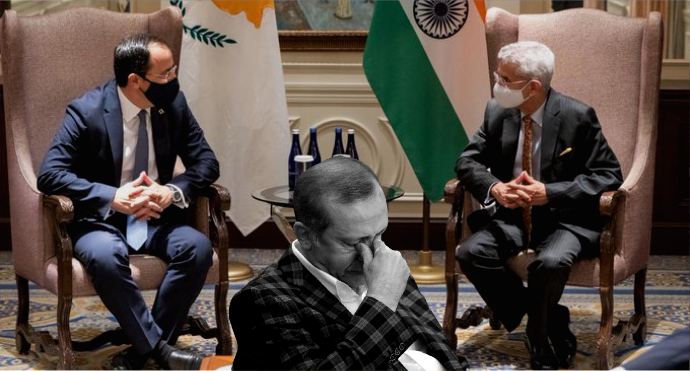On Tuesday, Turkish President Recep Tayyip Erdogan addressed the United Nations General Assembly during its General Debate. Like his last year’s speech at the UNGA, Erdogan once again poked his nose into Kashmir. Erdogan in his address on Tuesday said, “We maintain our stance in favour of solving the ongoing problem in Kashmir for 74 years, through dialogue between the parties and within the framework of relevant United Nations resolutions.” Last year, India’s Ministry of External Affairs (MEA) had said Erdogan’s remarks reflected neither an understanding of history nor of the conduct of diplomacy and that they will have strong implications on India’s ties with Turkey.
Now, the strong implications for Turkey have begun taking shape. Shortly after Erdogan raised the Kashmir bogey at the UNGA on Tuesday, India’s External Affairs Minister Dr S Jaishankar met his Cypriot counterpart Nikos Christodoulides and held discussions on the economic relationship between India and Cyprus. In a tweet, Jaishankar said, “Important that relevant UN Security Council resolutions in respect of Cyprus are adhered to by all.”
Delighted to meet FM @Christodulides of Cyprus.
Working to take our economic ties forward.
Appreciated his regional insights.
Important that relevant UN Security Council resolutions in respect of Cyprus are adhered to by all. pic.twitter.com/pZXPefT9Sj
— Dr. S. Jaishankar (Modi Ka Parivar) (@DrSJaishankar) September 21, 2021
Here’s Why the Development Is Very Significant
- A major conflict exists between Turkey and Cyprus since 1974.
- Turkey has stationed heavy weapons and more than 35,000 troops in Northern Cyprus since the island was split along ethnic lines in 1974.
- The Turkish Republic of Northern Cyprus – the proxy state that Turkey established, controls one-third of the island.
- Turkish Cypriots declared an independent state nearly a decade after Ankara invaded Northern Cyprus, but only Turkey recognizes it. The world community at large sympathises with the Greek Cypriots, who are facing a cultural genocide at the hands of the Turks.
India Smashes Turkey with Its Cyprus Card
India has begun dealing with Turkey in a language that Erdogan can comprehend. Erdogan is not a man who can be dealt with in a civilised manner. He is a rogue and insecure man, especially after the attempted coup d’état against him in 2016. Now, Erdogan aims to resuscitate the erstwhile Ottoman Empire and crown himself Caliph of the Muslim world.
It is Erdogan’s incessant lust for being seen as a messiah of Muslims that makes him raise the Kashmir bogey at the United Nations repeatedly. India, however, is simply not in a mood to allow small-time despots like Erdogan to poke their noses in Kashmir – which is sovereign Indian territory. So, India is giving it back as good as it gets.
Notice the similarities in the rhetoric of the Turkish President and India’s Foreign Minister? While the former raked up UN resolutions to corner India on the Kashmir issue, the latter referred to UNSC resolutions pertaining to Cyprus in order to show Erdogan his place. The internationally recognized southern Cyprus and Greece have been at the forefront of calling out Erdogan’s belligerence and furthering the cause for sanctions against Turkey. And India has been standing behind these countries like a solid rock, supporting them in their endeavour against a rabid Erdogan.
It must be noted that Turkey is an all-weather ally of Pakistan. The two countries had signed a Treaty of Eternal friendship way back in the 1950s. The Treaty was largely based on the Islamic identity of the two countries and a striking ideological resemblance. Both countries have majority-Sunni Muslim communities and both the countries look at the Islamic identity as central to national politics. It is this long-shared sentiment that has spurred Turkey into making diplomatic attacks against India on the issue of Kashmir at the multilateral forum.
India Launched its Anti-Turkey Campaign in 2019 Itself
In 2019, following Erdogan’s senseless rant against India at the UNGA, Prime Minister Narendra Modi met Armenian Prime Minister Nikol Pashinyan and Cyprus President Nicos Anastasiades. By holding top-level meetings with Cyprus and Armenia, countries which have been wronged by Turkey in the past, India had sent across a strong message to Turkey. Armenia shares a long history of strained relations with Turkey and Armenians still accuse Turkey of having committed an inhuman massacre of the Armenian population in the early twentieth century. Turkey is also accused of having played down the mass killings at that time. Most recently, Turkish involvement in the war against Armenia over the Nagorno-Karabakh region was out for the entire world to witness, as Ankara weaponised Azerbaijan with its TB2 armed drones.
Read more: PM Modi delivers a diplomatic knockout punch to Turkey with his Cyprus-Armenia move
Ever since, India’s ties with anti-Turkey powers of the Mediterranean have only grown from strength to strength. Turkey is pretty much the China of the Mediterranean. It is continuously eyeing expansion in the region in order to somehow get hold of natural gas and oil reserves which would salvage its falling economy – which Erdogan has played a critical role in ruining.
Now, by reaffirming India’s support for Cyprus and the UN resolution which Turkey acts in flagrant disregard of, Prime Minister Modi has sent a stern warning to Recep Tayyip Erdogan.
